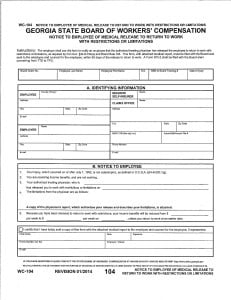A Medicare set-aside (MSA for short) is a mechanism sometimes used in settlement when Medicare might have an interest in your workers’ compensation case. Generally, funds from settlement create the Medicare-set aside account. An injured worker then uses those funds after settlement to pay for medical treatment for the work injury.
I do not intend this blog to be a complete description of the rules of when and how to use a Medicare set-aside. That information and advice should come from an attorney familiar with the specifics of your case.
Instead, I intend this blog to provide general information about what a Medicare set-aside is and to explain some situations where you should consider one.
 What are some of the situations where I might consider setting up a Medicare set-aside?
What are some of the situations where I might consider setting up a Medicare set-aside?
If you are already a Medicare beneficiary at the time your case settles, you will need to consider strongly a Medicare set-aside.
You are a Medicare beneficiary if you have received a Medicare card. Two of the most common reasons injured workers qualify for Medicare before settlement are:
- They reach 65 years of age
- They qualify for Social Security Disability and get disability benefits for two years
People who have applied for Social Security Disability benefits or will soon be 65 also need to strongly consider Medicare Set-Asides.
How do most Medicare Set-Aside accounts work?
The settlement document often specifies how the Medicare set-aside will be funded. Many times, the workers’ compensation insurance company funds the Medicare set-aside with a lump sum. Sometimes, they also purchase an annuity that makes annual payments.
Often, the settlement document contains the amounts that will go into the MSA. One issue that often comes up is whether that amount may change if Medicare requires a higher amount. Depending on the amount of the MSA and your Medicare status at the time of settlement, Medicare may or may not agree to review the MSA.
Sometimes, MSAs are self-administered. Other times, you or the insurance company hires a professional administrator to manage the money in the MSA.
Whoever administers the MSA generally has responsibility for making sure they use the MSA funds properly. A failure to do so could result in penalties from Medicare.
Why would I want to set up a Medicare set-aside?
MSAs can provide you with a safety net. At the time that your case settles, you do not know the exact amount of what your future medical treatment will cost. So, it is possible that you might not have enough money to pay for future medical treatment.
Many people wonder why they cannot just use Medicare to pay for treatment after settlement. The reason they cannot is the Medicare Secondary Payor (MSP) Act. This law makes Medicare secondary to workers’ compensation for payment of medical treatment.
People often solve this problem by considering Medicare’s interests when they settle their workers’ compensation cases. A Medicare set-aside provides one way to consider Medicare’s interests.
If the MSA is properly prepared and used and adequately considered Medicare’s interests, then Medicare should provide a safety net once the MSA is used up. This provides protection for injured workers when they settle their cases. But they have to make sure that they do everything right.
If my settlement amount is lower, can I just not consider Medicare’s interests?
Failing to consider Medicare’s interests could be risky. You might find that Medicare refuses to pay for any future treatment related to your work injury. If Medicare mistakenly pays for some treatment for your injury, they might also come after you to collect that money plus additional damages.
Do I have to use a Medicare set-aside to consider Medicare’s interests?
No. A Medicare set-aside is not the exclusive way to consider Medicare’s interests. You have other options to consider. The best option for you definitely will depend on the specific facts of your case.
 What are some of the situations where I might consider setting up a Medicare set-aside?
What are some of the situations where I might consider setting up a Medicare set-aside?









